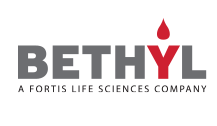Goat anti-Human ApoAI Antibody Biotin Conjugated

Product Details
Specifications
Request Formulation Change Phosphate Buffered Saline (PBS) containing 0.2% BSA and 0.05% Pro-Clean 400
Request Formulation Change 75 mM PBS, 75 mM NaCl, 0.5 mM EDTA, 0.02% NaN3, 0.1mM PMSF, pH 7.3
Request Formulation Change
Additional Product Information
Apo AI comprises approximately 70% of the protein moiety in HDL. It is a single polypeptide chain consisting of 243 amino acid residues without disulfide bound and with glutamic acid as the C-terminal residue and aspartic acid as the N-terminal residue. The molecular weight is reported to be 28 kDa (Brewer et al., 1978). The roles of Apo AI in HDL function include reverse cholesterol transportation, lipid cholesterol binding, lecithin-cholesterol acyl transferase (LCAT) activation, and receptor binding, which is responsible for cholesterol esterification in plasma. Besides participate in cholesterol metabolism, Apo AI and HDL also suppress neutrophil activation, inhibit bacterial endotoxin, induce trypanosomal lysis, and other physiological activities. (Brouillette et al., 2001). Apo AI levels may be inversely related to the risk of coronary disease. In previous research, Apo AI may affect diet-induced inflammation by either directly or indirectly altering lipid rafts. (Cheng et al., 2012)
Alternate Names
apo(a); apo-AI; ApoA-I; Apolipoprotein A1; apolipoprotein A-I; epididymis secretory sperm binding protein
Applications
Not all listed applications have been specifically tested by our laboratory.
